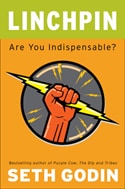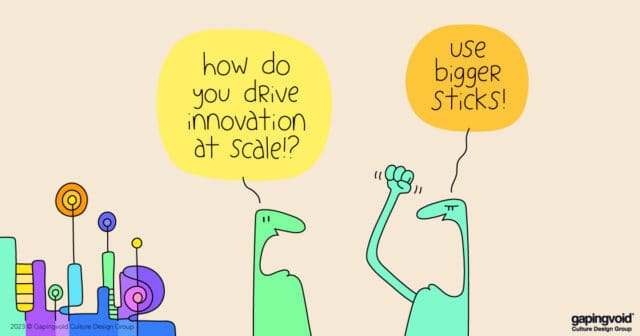
[N.B. The “Ten Questions” archive is here.] [To read other people’s reviews, go to the Linchpin Squidoo page.]
My friend and mentor, Seth Godin has a new book out: “Linchpin: Are You Indispensable?”.
As has become a regular habit with his last couple of books, to celebrate the launch I asked him ten questions, which he kindly answered below.
LINCHPIN: TEN QUESTIONS FOR SETH GODIN.
1. HUGH: OK, let’s get it over with- What is a “Linchpin”? What is the book about?
SETH: You’re a linchpin, Hugh. So are all those crazy people we can’t live without, people who bring art to work, people who reach out, make a connection, cause change to happen. The linchpin is the person who is indispensable, because they refuse to become an interchangeable part, someone who merely follows the manual. In the hardware store, the linchpin is a lightweight little piece that holds the wheel to the axle. Very difficult to live without.
2. In your book, Purple Cow, your message was “Everyone’s a Marketer, now.” In All Marketers are Liars, the message was, “Everyone’s a Storyteller, now.” In Tribes, it was “Everyone’s a Leader, now.” In Linchpin, the message surprised me: “Everyone’s an Artist, now”. Tell us about your thesis.
Artist doesn’t mean painter or cartoonist or playwright. Artist means someone willing to stand up, stand out and make change. In a stable environment, we worship the efficient factory. Henry Ford or even David Geffen… feed the machine, keep it running smoothly, pay as little as you can, make as much as you can. In our post-industrial world, though, factory worship is a non starter. Cheap cogs are worth what they cost, which is not much. In a changing environment, you want people who can steer, innovate, provoke, lead, connect and make things happen. That’s my thesis. This is a new revolution, and just as Marx and Smith wrote about the industrial revolution, I’m writing about ours.
3. A key term you used throughout the book was “Emotional Labor”. Please explain what that is, and why that matters to anyone wishing to become a Linchpin.
It’s emotional labor to insist that your publisher leave the sexy and dirty bits in your last book, even though it certainly would have been easier to take them out. It’s emotional labor to move to Texas even though it might be easier to just hang out with friends. It’s emotional labor to do the work even when you don’t feel like it. Mostly, I’m talking about doing the difficult work of bringing your very best self to each interaction, because to do otherwise is a mortal sin.
4. Obviously, we’re not all artists, in the strictest sense of the word. I’m a professional artist myself, and even I don’t much like using that term. But here’s Seth, trying to bust the definition of “Artist” wide open. I get the feeling this was not you trying to redefine the term in order to create controversy for the sake of being clever, but you are trying to challenge people to think about their work differently, to make them think about WHAT EXACTLY has to happen, for them to become a Linchpin. Yes?
Well, what should we call these people, these linchpins? I mean, we have a word for a painter who merely does derivative work: a hack. But what do we call a customer service rep or an insurance adjuster or landscape architect that changes the game, that elevates each interaction and that takes enormous emotional and professional risk with their work? I think they need a name, so I stole one. I call them artists.
5. One thing I find interesting about the book (and all your other ones, as well) is that you don’t offer any easy answers. You never say, “This is where the world is headed, and this is how WE ARE going to make it work”. Your shtick is more, “This is where the world is headed, and this is what YOU have to think about, if you don’t want to be thoroughly crushed.” And yet I still see people asking you, “Please tell me what to do to incorporate your kind of new, groovy thinking, WITHOUT ME having to change my life or my modus operandi in an way whatsoever. Please show me where the autopilot button and the cruise control are” etc. Do you find that frustrating? Is it happening more as your work gets more well known? Less?
Frustrating isn’t really the right word. I think it was sad at first, because it’s almost like the Wizard of Oz… Dorothy had the power all along, right? But now I view it as an opportunity. It’s so tempting to start drawing maps for people. It makes them happy and it makes me feel smart. But resisting that temptation is the right thing to do, because once someone does it on their own a few times, they become unstoppable. Watching that change occur is one of the highlights of my professional life. And in fact, every great teacher I’ve ever known seeks the same outcome.
6. If I had to describe your typical writing style (of which I am a huge fan, of course), I’d call it “Dryly understated, humorous, streetwise and lucid”. This book somewhat surprised me. It seems to have a more angry and more emotional tone than your previous books. Was that just me? Is your writing style becoming angrier in general, or did the inherent subject matter in the book just get you more riled up than usual?
It’s not angry, Hugh. It’s urgent.
I don’t think most people realize the precarious nature of our current situation, how close we are to the edge, and how little time we have to get our act together.
7. I’ve known you for a little while; we met right around the time that Purple Cow came out in 2003. Back then to me you were this articulate, entertaining and successful entrepreneur, who had just written this cool business bestseller. Then more books came out and I started seeing this more “author” sensibility emerging. You obviously enjoyed writing the books, and you obviously liked seeing people reading them and liked helping make change happen. But in this last year or so, I’ve seen your shtick become more “rabbinical” i.e. it seems you’ve gotten more interested in teaching people- younger people especially. Like you no longer care so much about your own success and “affecting change” yourself, but are more interested in teaching people how to become successful and affect change themselves. Am I close? Are you evolving?
I hope we’re all evolving. I think my mission is the same as it has been since that day on the canoe dock in 1978 when I decided it would be very cool indeed to help people achieve more than they thought they could. What has changed is my awareness of how the system pushes people like me to be manual writers. Publishers and others really want to give the market what it wants, and what it wants are Dummies books and fast easy change (Hey! It’s been a year… let’s elect a new senator!). Even now, the single best way to get a lot of blog traffic is to post a list of Ten Ways to… and make sure you mention Ron Paul, Apple Computer and the inherent difference between men and women. Try it, it works.
So I’ve experienced the feedback you get when you draw a map, and it’s nice, but the real win is helping people draw their own. To see the world as it is. That’s a lot more difficult. People need glasses, not a map.
8. I saw this in your last book, Tribes, and I see again it Linchpin. Though I’m sure there are tons of people who would prefer it if they were, your books are not instruction manuals. You’re not telling people what to “Do”. You’re telling people to “Decide”. A subtle difference, but it’s an important one. Please tell us more.
Oh, I don’t think it’s subtle at all. I think it’s a HUGE difference. We hate to decide. We avoid deciding. We hide from it.
Once someone decides, they almost always succeed (unless they want to win an Olympic medal or some other ridiculous prize awarded to just a few). The decision is the hard part, but we spend precious little time on it.
9. We have a mutual friend in New York, Fred, who is a tremendously successful venture capitalist. But as anyone who knows him well will testify, his success has diddly-squat to do with love of money and all its trappings, and everything, EVERYTHING to do with the fact that, quite simply, he utterly loves what he does. He just ADORES waking up every morning and clicking his heels on his way to work. I grew up in a pretty standard, middle class corporate family. Back in my parent’s day, “loving” your job was considered almost a taboo; something inherently detrimental to long-term personal career success, and the success of the company team. But there seems to be an underlying message in Linchpin that THAT THIS HAS ALL CHANGED. That if you don’t love your job, not only will you be a miserable wreck the rest of your life, but hey, you’re less likely to be successful in business, as well. Care to elaborate?
The amazing thing is that in every job, every one, there are people who hate it and people who love it. There are clock watchers on Sand Hill Road. There are people bussing tables at a coffee shop who race to work each day. The job is irrelevant, pretty much. It’s the decision.
Fred does great work as a VC because his motives are transparent, his judgment is excellent and he keeps his promises. All three are essential for him to love his job, and he does. Since he’s not willing to trade that joy for a few bucks, he sticks to his principles. And, here’s the cool irony, the more he does that, the more money he makes!
10. Of all the books you’ve written (and I love them all), this seems to be your most challenging. Your previous messages- Everyone’s a Marketer, Everyone’s a Storyteller, Everyone’s a Leader etc- though compelling enough, somehow seem far easier to digest compared the simple message in Linchpin: “Love what you do, or fail.” Why do you think that idea is STILL so difficult for so many people? Do you expect this book to be as well received as your previous ones? Does it matter?
If you had asked me four weeks ago, I would have been a happy pessimist. Happy because I wrote precisely the book I wanted to write, regardless of the consequences. I was literally ready for almost every one to hate it. And a pessimist because I’m pushing people awfully hard with this one.
But you didn’t ask me four weeks ago, you asked me today. And today is a few weeks after 2000+ of my readers made a donation and got a review copy and WOW. They get it. It’s working. It’s resonating.
My work is done here, as the saying goes. To unleash something like this on the world, to go out this far on a limb and have people support you and embrace you and run with it… it’s the most amazing feeling.
Thanks, Hugh, for giving me something to write about and for showing us all a way to live. We can’t do it without you.
[The best way to support gapingvoid is to sign up for the “Daily Cartoon” Newsletter.]



